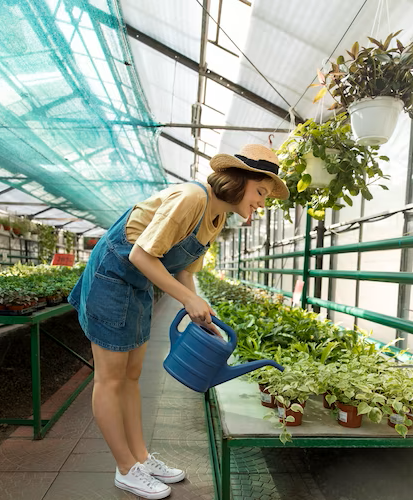The Greenhouse allows you to Unlock Nature’s Bounty Under a Glass Roof Here aspiring gardeners can experience the joys of nurturing plants year-round, regardless of climate or season. In this blog post, we are going to delve into the benefits and drawbacks of greenhouse gardening.
Reduced Water Usage
One of the significant benefits of greenhouse gardening is the conservation of water. Unlike outdoor gardens, greenhouses offer controlled climates that significantly reduce water evaporation. This controlled environment helps plants retain moisture better, resulting in less water usage overall. With the planet facing water scarcity issues in many regions, greenhouse gardening provides a sustainable alternative by minimizing water waste and increasing plant survival rates.
Thus, In arid regions like California’s Central Valley, greenhouse farmers have reported reducing water usage by up to 80% compared to traditional farming methods. This significant decrease is achieved through precise water delivery systems like drip irrigation, leading to efficient plant growth and water conservation.
Year-Round Growing Season

Greenhouse gardening offers the novel ability to grow plants year-round, even when the outside climate is not conducive to plant growth. By extending the growing season, gardeners can enjoy seasonal delights like fresh tomatoes or aromatic herbs, regardless of the calendar month. Additionally, greenhouse gardening enables cultivators to experiment with exotic or out-of-season plants that would typically be out of reach.
Thus, in countries with long, harsh winters, like Sweden, greenhouse enthusiasts can enjoy growing tropical plants, such as vibrant orchids or succulents, all year long. This extends the gardening season and brings a touch of exotic beauty to otherwise bleak winters.
Environmentally Friendly Practices
Greenhouse gardening encourages environmentally friendly practices that benefit both gardeners and the planet. By understanding and controlling the entire growth cycle, gardeners avoid harmful pesticides and embrace organic farming practices. Moreover, greenhouses provide a shield against pests and diseases, reducing the need for chemical treatments. This eco-friendly approach contributes to overall sustainability and the creation of healthier, more nutritious produce.
Real-life example: “Organic Certified” greenhouses, like those in the Netherlands, have successfully eliminated the use of synthetic chemicals, enhancing food safety and reducing pesticide contamination in the environment. Such practices promote a sustainable food system while protecting biodiversity.

Upfront Costs
While the benefits of greenhouse gardening are evident, it’s essential to consider the potential drawbacks as well. One significant disadvantage is the high upfront cost of building or purchasing a greenhouse. The construction materials, environmental control systems, and installation expenses can add up, making it a substantial investment compared to traditional outdoor gardening.
In fact, hobby gardeners starting small may opt for DIY options like hoop houses or repurposed structures to lower their initial costs. Building your own greenhouse is a comprehensive guide on how to do it well and not expensively. Because, commercial greenhouse farms require substantial capital investments to ensure a fully controlled environment with optimal growing conditions.

Regular Maintenance Required
Greenhouses demand diligent maintenance and care to ensure optimal plant growth. The controlled environment must be monitored continuously, including proper ventilation, temperature regulation, humidity control, and pest management. Neglecting these crucial factors can lead to plant stress, decreased production, or the spread of diseases, which may be harder to control within a confined space.
That’s why, professional greenhouse gardeners establish strict schedules to monitor and manage environmental factors effectively. By investing time and effort into ongoing maintenance, they achieve high yields and healthy crops, but it requires dedication and a green thumb.
Greenhouse gardening presents an array of benefits, such as reduced water usage, year-round growing potential, and adherence to environmentally friendly practices. These advantages contribute to sustainable food production and reduced environmental impact. However, it is important to consider the drawbacks, such as upfront costs and regular maintenance requirements. Ultimately, greenhouse gardening offers an exciting and rewarding opportunity to explore your green thumb regardless of climate limitations and gives you the power to create

